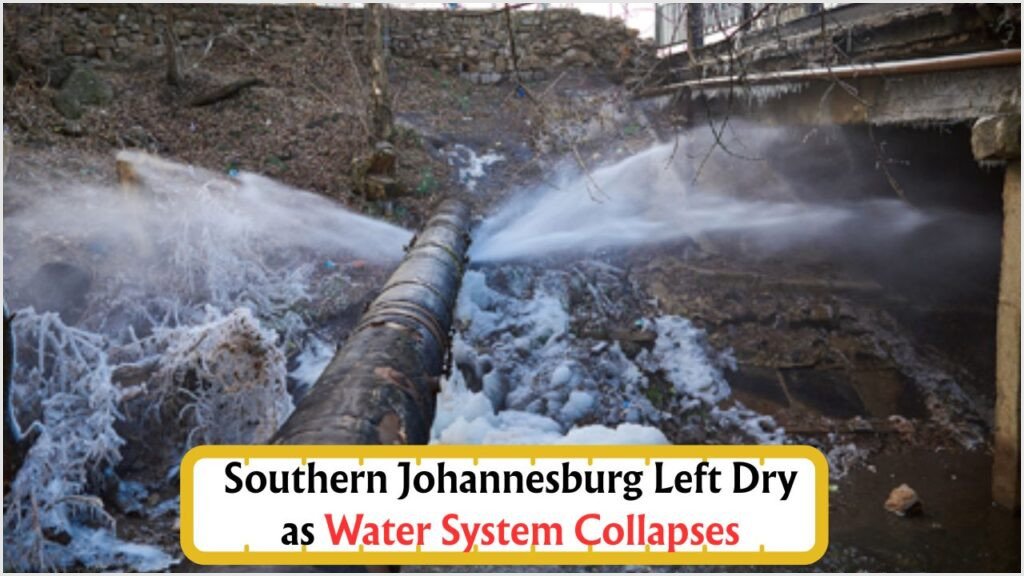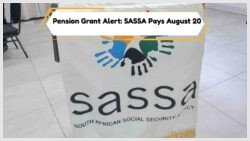Southern Johannesburg’s Water Woes Worsen: Burst Pipe Collapse Deepens City’s Crisis: Southern Johannesburg is grappling with escalating water challenges as a significant burst pipe collapse exacerbates the city’s existing crisis. The residents in the area have been facing intermittent water supply issues, and this recent development has only added to their woes. In recent months, water scarcity has become a pressing issue in the region, affecting households, businesses, and essential services. The local authorities are under immense pressure to address this crisis promptly. The burst pipe, located in a critical junction, has disrupted the water flow to several neighborhoods, prompting urgent interventions. The situation has highlighted the need for infrastructural improvements and efficient water management systems to ensure a steady and reliable water supply in the future.
Understanding the Impact of the Burst Pipe on Southern Johannesburg
The burst pipe in Southern Johannesburg has caused a ripple effect, impacting not only the immediate area but also the broader region. Households have been left without water for extended periods, forcing residents to seek alternative sources such as water tankers. Businesses, particularly those reliant on water for daily operations, have experienced significant disruptions, leading to financial losses. Schools and healthcare facilities are also struggling to maintain their services amidst the water shortage. This crisis has brought to light the vulnerabilities in the city’s water infrastructure and the urgent need for sustainable solutions. The burst pipe has created a cascade of challenges, highlighting the interdependence of the city’s systems and the importance of robust infrastructure to withstand such incidents.
 Discover the Fastest Way to Unlock NSFAS Funds: Thousands Swear by This Proven Appeal Format!
Discover the Fastest Way to Unlock NSFAS Funds: Thousands Swear by This Proven Appeal Format!
- Households facing water shortages
- Business disruptions due to lack of water
- Schools and hospitals struggling to operate
- Increased demand for water tankers
- Financial losses in the community
- Highlighting infrastructural vulnerabilities
- Need for sustainable water management solutions
Efforts to Mitigate the Water Crisis in Johannesburg
Local authorities are working tirelessly to mitigate the impact of the water crisis in Southern Johannesburg. Emergency measures have been implemented, including the deployment of water tankers to the most affected areas. Repair crews are on-site, working around the clock to fix the burst pipe and restore normal water supply. Additionally, the city is exploring long-term solutions to prevent similar incidents in the future. These include infrastructure upgrades, better resource management, and the adoption of advanced technologies for water monitoring and distribution. Public awareness campaigns are also being launched to encourage water conservation among residents, aiming to reduce unnecessary usage and ensure a more sustainable approach to water consumption in the city.
| Measure | Implementation | Goal | Timeline | Status |
|---|---|---|---|---|
| Water Tankers | Deployed | Immediate Relief | Ongoing | Active |
| Pipe Repairs | In Progress | Restore Supply | 2 Weeks | Ongoing |
| Infrastructure Upgrades | Planned | Long-term Solution | 6 Months | Pending |
| Public Awareness | Launched | Conservation | Continuous | Active |
| Advanced Monitoring | Under Review | Efficiency | 1 Year | Pending |
The Role of Community Engagement in Addressing Water Woes
Community engagement is playing a crucial role in addressing the water woes in Southern Johannesburg. Residents are coming together to support each other during this challenging time, sharing resources and information. Community leaders are working closely with local authorities to ensure that the needs of the most affected are prioritized. This grassroots involvement is essential for fostering a sense of solidarity and resilience among residents. Moreover, community-driven initiatives are being encouraged to promote water conservation and educate the public on effective water-saving practices. By involving the community in decision-making processes and solution implementation, the city can build a more inclusive and effective response to its water challenges.
 August 17, 2025: R1,250 Foster Child Grant Payout Begins – Ensure You Receive Your SMS Alert!
August 17, 2025: R1,250 Foster Child Grant Payout Begins – Ensure You Receive Your SMS Alert!
- Community resource sharing
- Support from local leaders
- Grassroots involvement
- Promoting water conservation
- Educational initiatives
- Inclusive decision-making
- Fostering resilience
Long-Term Strategies for Sustainable Water Management
| Strategy | Description | Impact | Challenges | Opportunities |
|---|---|---|---|---|
| Infrastructure Investment | Upgrading water systems | Improved reliability | High cost | Job creation |
| Conservation Programs | Reducing water usage | Lower demand | Public engagement | Educational benefits |
| Technology Adoption | Smart water meters | Efficiency gains | Initial setup | Data-driven insights |
| Policy Reforms | Regulatory changes | Enhanced management | Political hurdles | Long-term sustainability |
Expert Opinions on Johannesburg’s Water Infrastructure
Experts in the field have weighed in on Johannesburg’s water infrastructure issues, offering insights and recommendations for improvement. Many highlight the need for significant investment in modernizing the city’s aging water systems, which are struggling to keep pace with the growing demand. Experts also emphasize the importance of adopting innovative technologies, such as smart water meters and leak detection systems, to enhance efficiency and prevent future crises. Additionally, they advocate for policy reforms that prioritize sustainable water management and encourage community involvement. By listening to these expert opinions and incorporating their recommendations, Johannesburg can develop a more resilient and efficient water infrastructure capable of meeting the needs of its residents now and in the future.
- Investment in modernization
- Adoption of smart technologies
- Importance of policy reforms
- Community involvement
- Preventing future crises
- Enhancing efficiency
Water Conservation Tips for Johannesburg Residents
As Johannesburg faces ongoing water challenges, residents are encouraged to adopt water conservation practices in their daily lives. Simple changes can make a significant difference in reducing water consumption and ensuring sustainability. Here are some effective tips for conserving water at home:
- Fix leaks promptly to prevent water waste.
- Limit shower time and install low-flow showerheads.
- Turn off the tap while brushing teeth or washing hands.
- Use a broom instead of a hose to clean driveways.
- Collect rainwater for garden use.
- Run dishwashers and washing machines with full loads only.
- Educate family members about the importance of saving water.
Preparing for Future Water Challenges in Johannesburg
To prepare for future water challenges, Johannesburg must adopt a proactive approach that includes a combination of infrastructural improvements, policy reforms, and community engagement. By investing in resilient water systems and encouraging conservation, the city can build a sustainable future for its residents. Collaboration between local authorities, experts, and the community is essential to develop effective strategies and ensure their successful implementation. As Johannesburg navigates these challenges, it remains crucial to prioritize water security and work towards a future where access to clean water is a certainty, not a luxury.
- Infrastructural improvements
- Policy reforms
- Community engagement
- Investing in resilience
- Encouraging conservation
FAQ Section
What caused the burst pipe in Southern Johannesburg?
Aging infrastructure and increased pressure on water systems are the primary causes of the burst pipe in Southern Johannesburg.
How are local authorities addressing the water crisis?
Local authorities are implementing emergency measures such as deploying water tankers, repairing the burst pipe, and planning long-term infrastructure upgrades.
What can residents do to conserve water?
Residents can conserve water by fixing leaks, using water-saving devices, and adopting mindful water usage habits.
What long-term solutions are being considered?
Long-term solutions include infrastructure upgrades, technology adoption, policy reforms, and community-driven conservation programs.
How can the community get involved in addressing the water crisis?
The community can get involved by participating in conservation initiatives, supporting local efforts, and staying informed about water management practices.




